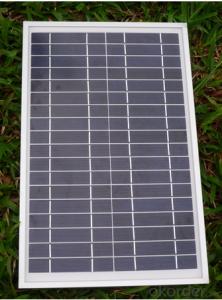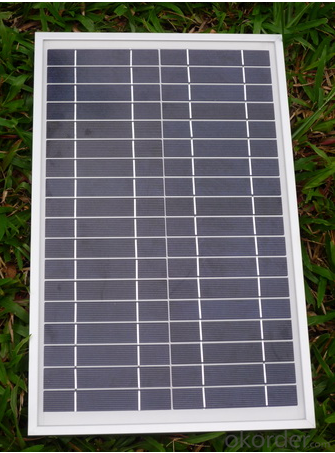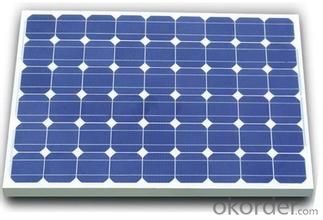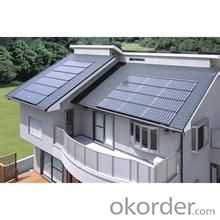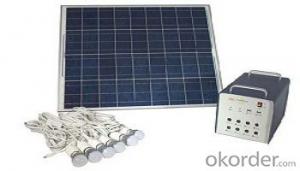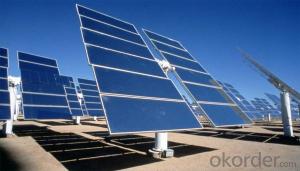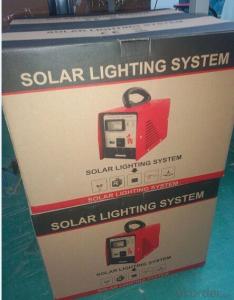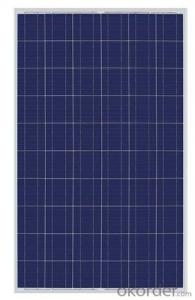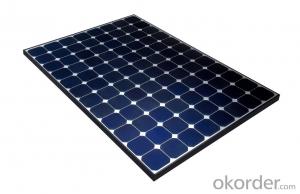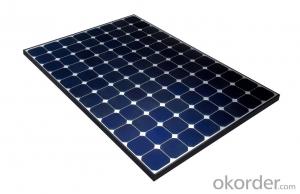1000W Solar Energy Systems Brooklyn Park - Approved by TUV UL CE
- Loading Port:
- Tianjin
- Payment Terms:
- TT OR LC
- Min Order Qty:
- 1 pc
- Supply Capability:
- 100 pc/month
OKorder Service Pledge
OKorder Financial Service
You Might Also Like
Specification
1000W Solar Home Solution Approved by TUV UL CE
Production description
PV array:
Convert sunlight instantly into DC electric power. Formed by the solar modules (also called photovoltaic
modules) in accordance with the system requirements for series and parallel.
Solar charge controller:
A charge controller may be used to power DC equipment with solar panels. The charge controller
provides a regulated DC output and stores excess energy in a battery as well as monitoring the battery
voltage to prevent over charge or over discharge. An inverter can be connected to the output of a charge
controller to drive AC loads.
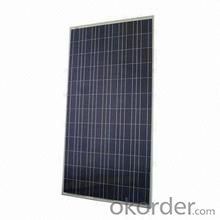
Feature
1.High conversion efficiencies resulting in superior power output performance.
2.Outstanding power output even in low light or high temperature conditions
3.Optimized design for ease of soldering and lamination
4.Long-term stability,reliability and performance
Physical characteristic
1. Rigorous quality control meets the highest international standards.
2. High-transmissivity low-iron tempered glass, strong aluminium frame.
3. Using UV-resistant silicon.
4. IS09001/14001/CE/TUV/UL
- Q: Can solar energy systems be used for powering outdoor appliances?
- Yes, solar energy systems can be used to power outdoor appliances. Solar panels collect sunlight and convert it into electricity, which can then be used to power various appliances such as outdoor lights, fans, heaters, or even charging stations for electronic devices. This renewable energy source is ideal for outdoor use as it eliminates the need for traditional power sources and reduces carbon emissions.
- Q: Can solar energy systems be used for powering data centers or IT infrastructure?
- Yes, solar energy systems can definitely be used for powering data centers or IT infrastructure. Solar panels can generate electricity from sunlight, which can then be used to power various electrical components in data centers like servers, cooling systems, and networking equipment. Additionally, advancements in solar technology have made it possible to store excess solar energy in batteries, ensuring a continuous power supply even during cloudy periods or at night. This not only reduces reliance on traditional power sources but also helps in reducing carbon emissions and overall energy costs for data centers.
- Q: What is the impact of bird droppings on solar panel efficiency?
- Bird droppings can significantly reduce the efficiency of solar panels by blocking sunlight and reducing the amount of energy they can produce.
- Q: What is the role of solar-powered ventilation systems in solar energy systems?
- The role of solar-powered ventilation systems in solar energy systems is to improve energy efficiency and enhance indoor air quality. These systems use solar energy to power fans or vents, which help circulate air and remove excess heat or moisture from buildings. By utilizing renewable energy, solar-powered ventilation systems reduce reliance on traditional power sources and contribute to a more sustainable and eco-friendly approach to cooling and ventilating spaces.
- Q: Can solar energy systems be used in areas with limited access to healthcare?
- Yes, solar energy systems can certainly be used in areas with limited access to healthcare. Solar energy can power medical equipment, refrigeration systems for vaccines and medicines, lighting in healthcare facilities, and even provide electricity for telemedicine services. Implementing solar energy systems in such areas can help overcome the lack of reliable electricity supply, thereby improving healthcare access and delivery.
- Q: Can solar energy systems be installed in urban areas with limited space?
- Yes, solar energy systems can be installed in urban areas with limited space. In fact, urban areas often have rooftops, facades, and other surfaces that can be utilized for solar panel installation. Additionally, advancements in technology have made it possible to install smaller and more efficient solar panels, allowing for better use of limited space in urban environments.
- Q: Can solar energy systems be used for powering manufacturing facilities?
- Yes, solar energy systems can be used for powering manufacturing facilities. Solar power systems can generate electricity to meet the energy demands of manufacturing processes, reducing reliance on traditional fossil fuel-based electricity. This renewable energy source can contribute to sustainable and environmentally friendly manufacturing practices while potentially lowering operational costs in the long run.
- Q: Can solar energy systems be used for powering sports stadiums or arenas?
- Absolutely, sports stadiums or arenas can definitely utilize solar energy systems for power. In fact, numerous stadiums and arenas worldwide have already begun implementing solar energy as an environmentally-friendly and economically-viable power source. Solar energy systems, like solar panels, capture the sun's energy and convert it into electricity. This generated electricity can then be utilized to power various components of sports stadiums or arenas, including lighting, scoreboards, sound systems, and even electric vehicle charging stations. The quantity of solar energy required to power a stadium depends on its size, energy requirements, and the level of energy efficiency implemented. There are multiple advantages to employing solar energy in sports stadiums or arenas. Firstly, it is a clean and renewable energy source, contributing to a reduction in greenhouse gas emissions and a decrease in reliance on fossil fuels. This aligns with the increasing global focus on sustainability and combatting climate change. Secondly, solar energy offers long-term cost savings. Although the initial installation costs may be higher compared to traditional energy sources, the operational and maintenance expenses of solar panels are relatively low. Over time, the energy generated by solar panels can offset electricity costs, resulting in significant savings in the long run. Furthermore, solar energy systems can also serve as a visible symbol of environmental responsibility, inspiring fans, athletes, and communities to adopt sustainable practices. Sports stadiums and arenas often attract large audiences and media attention, making them high-profile venues. By embracing solar energy, these facilities can demonstrate their commitment to clean energy and motivate others to do the same. In conclusion, solar energy systems can effectively power sports stadiums or arenas. They provide a clean, renewable, and cost-effective alternative to traditional energy sources, while also promoting sustainability and inspiring others to embrace clean energy solutions.
- Q: Can a solar energy system be installed in areas with high pollution levels?
- Yes, a solar energy system can be installed in areas with high pollution levels. While pollution may slightly reduce the efficiency of the system, solar panels can still generate electricity even in polluted environments. Additionally, installing solar energy systems in such areas can help in reducing reliance on polluting energy sources and contribute to cleaner air and environmental sustainability.
- Q: I usually have to use about 10 degrees, more in the summer! Winter sunshine time 10 hours! Who knows how much a set price, what brand?
- Sold to the power supply bureau 0.45 yuan once, the state subsidy fee of $0.42, a year issued 3000 kwh.
Send your message to us
1000W Solar Energy Systems Brooklyn Park - Approved by TUV UL CE
- Loading Port:
- Tianjin
- Payment Terms:
- TT OR LC
- Min Order Qty:
- 1 pc
- Supply Capability:
- 100 pc/month
OKorder Service Pledge
OKorder Financial Service
Similar products
Hot products
Hot Searches
Related keywords
